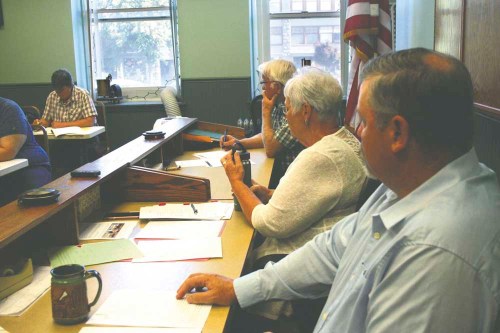Commissioners aim to ban psilocybin in county
Published 7:00 am Thursday, July 7, 2022

- In this photo from July, county counsel Paige Sully, left, briefs the Wallowa County Board of Commissioners, from left, John Hillock, Susan Roberts and Todd Nash on a resolution to ban psilocybin facilities in the county. Such facilities are allowed under a state law passed in 2020.
ENTERPRISE — Wallowa County voters will be asked to consider an outright ban on the establishment of psilocybin facilities here once county officials complete work on a ballot measure for Nov. 8.
The Wallowa County Board of Commissioners discussed the matter with county counsel Paige Sully at its meeting Wednesday, July 6, and instructed Sully to prepare an ordinance that could be passed after two public hearings are held on the issue.
Trending
Commission Chairwoman Susan Roberts instructed Sully to work with Tera Elliott, the commissioners’ administrative assistant, to schedule the public hearings. The hearings would have to be completed and a resolution passed by Sept. 8 to get on the November ballot, the county Clerk’s Office said.
The proposed ballot measure would ban psilocybin facilities just in unincorporated areas of the county. The way the law is written, Roberts said, allows each jurisdiction to act for its own interests.
Legalization of psilocybin products and the provision of psilocybin services was approved by Oregon voters in November 2020 under Ballot Measure 109 that created Oregon Psilocybin Services as a new section within the Oregon Health Authority.
Psilocybin mushrooms — commonly known as “magic mushrooms” — are believed to be therapeutically helpful for some.
The Johns Hopkins Center for Psychedelic and Consciousness Research has treated psychiatric and behavioral disorders with psilocybin, as well as on healthy patients, saying positive results extend for up to a year, according to its website.
But psilocybin’s greater use has been as a recreational hallucinogenic drug that concerns the county commissioners.
Trending
Roberts said she’s aware psilocybin can help in therapy, but she and the other commissioners are concerned that allowing even heavily restricted psilocybin into the county may open the door for recreational use.
“The best-laid plans always end up …” she said. “That’s grand. You have to stay there until the effects of the thing wear off and then you can go, but pretty soon, people will start wanting that changed, you know, ‘Can I only have this much and take it home?’ and what they said to begin with doesn’t matter.”
There’s also the chance that if the county bans it, the cities within the county and neighboring counties might not.
“We just ban it in the county and the cities are able to do what they want,” Roberts said.
There’s also the possibility that if the county does not ban it and the cities in the county do and neighboring counties do as well, Wallowa County could become a haven for the psilocybin industry.
Although she did not have a recommendation on how the commissioners should act, Sully did offer insight into consequences of possible actions.
“The problem is that if you approve it, all your adjacent cities and counties, if they ban it, guess where it will locate — that one jurisdiction that hasn’t,” she said.
Sully said the state has yet to establish its rules for the Psilocybin Services Section, but it’s expected to be ready to start issuing licenses by January, thus it’s in the county’s interest to take action.
The commissioners wondered how legal psilocybin compares with legal marijuana. Oregon legalized the medical use of marijuana in 1998 and then added recreational use in 2016.
While there is a similarity in the medical legalization of psilocybin and marijuana, Sully said, there is no similarity between legal psilocybin and recreational marijuana. The only dispensary for recreational marijuana in the county is in Joseph.
Sully emphasized that under the 2020 law, such recreational use of psilocybin won’t be allowed.
“This will be like marijuana. You’ll have to have a licensed facility to grow it and it will be tracked and records kept and you will have to use it on site,” she said. “It will not be available for personal use in your home or anyplace else.”









